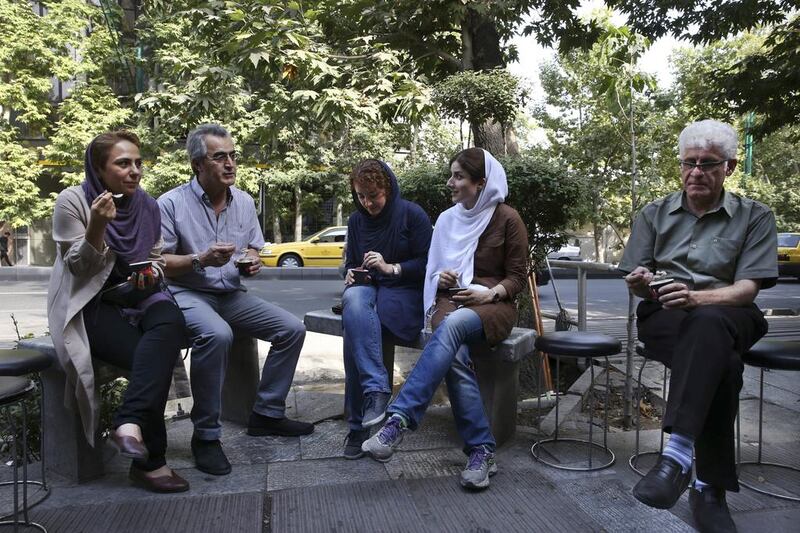A new opinion poll sheds light on key issues as seen through the eyes of Iranians. They include views on the nuclear deal, president Hassan Rouhani, next year's presidential election, Iran’s involvement in the Syrian civil war, other countries and ISIL.
On July 14 last year, Tehran and the P5+1 countries (China, France, Germany, Russia, the United Kingdom and the United States) reached an agreement on Iran’s nuclear programme. The deal was to curb nuclear-weapons development in exchange for sanctions relief. Mr Rouhani told Iranians that the agreement would improve economic standards.
After the nuclear deal was agreed, polls showed that 63 per cent of Iranians expected to see improvement in the economy and living standards within a year. In the new poll, 74 per cent of Iranians said there had been no economic improvements in the past year.
This could be due to several factors, including high unemployment, the state-owned and state-led economy, lack of an open market and business opportunities for the public, the increasing gap between rich and poor, and the accumulation of wealth among the gilded circle in power and other major players such as the Supreme Leader Ayatollah Ali Khamenei, Iran’s Revolutionary Guard Corps, and the elite business class who control the major sociopolitical and economic sectors.
Since the nuclear agreement was reached, unemployment has increased from about 10.8 per cent to 12 per cent. The government has also cut subsidies, increasing the cost of living.
When it comes to Mr Rouhani’s re-election prospects, his popularity and standing are not as high as they used to be. Intriguingly, the new poll reveals that the popularity of former president Mahmoud Ahmadinejad is increasing.
Mr Ahmadinejad had announced his retirement from politics but the latest signs indicate that he is positioning himself to lead the Islamic Republic again. During his presidency, people enjoyed subsidies on many items including petrol, gas and electricity, and his government paid monthly cash handouts of about $17 (Dh62) to every person.
The poll shows that Mr Ahmadinejad now trails Mr Rouhani by only 8 percentage points, compared to 27 points in May last year.
In addition, 75 per cent of Iranians believe that the United State is to blame for the lack of improvement in their economy. They think that the US has been creating hurdles preventing Iran from doing business with western companies and fully rejoining the global financial system.
This could be due to the Iranian leaders’ rhetoric, narratives in the state-owned media and a general lack of understanding about the terms of the nuclear agreement.
About 65 per cent of the population still watch Iran’s domestic news channels every day, compared to the 25.4 per cent who use the internet as a main news source and 18.2 per cent who use satellite television.
The least favourite countries or groups for Iranians are ISIL (97.6 per cent had a very unfavourable opinion) and Saudi Arabia (81.3 per cent very unfavourable). While the US government is not popular, many Iranians support cultural, educational, tourism and sporting exchanges between Iran and the US.
The most favourable countries or groups are Syria, Hizbollah and Iraq. The favourability of Turkey this year is half the level it was in 2014.
When it comes to the understanding of the nuclear agreement, many Iranians have the perception that it entailed the lifting of all sanctions. The Iranian political establishment and the media outlets did not make it clear to the public that the deal would lift the four rounds of economic sanctions imposed by the United Nations Security Council, but not Washington’s unilateral sanctions, or some of the other sanctions linked to human rights abuses and the sponsorship of terrorism. Some Iranians also believed that the deal would lead to full rapprochement between Iran and the US, enabling Iranian travel or emigration to the West.
The percentage of Iranian people who understand that the deal does not cover US sanctions has increased from 31 to 60 per cent.
An overwhelming majority of Iranians – roughly 80 per cent – believe it is very important that their country should continue developing its nuclear programme.
One intriguing finding is that the person who has the highest level of “very favourable” views among Iranians is Gen Qassem Soleimani, the head of the Revolutionary Army's Quds Force. His popularity has increased, perhaps because he is projected by the Iranian media as the saviour of the Shia in Iraq and Syria, a patriot and the protector of Iranians from ISIL.
The favourability of high-profile hard-line politicians such as Muhammad Bagher Ghalibaf and Ali Larijani has also increased. This suggests a great challenge for Mr Rouhani in the lead-up to next year's election.
Dr Majid Rafizadeh is an Iranian-American Havard scholar and president of the International American Council on the Middle East
On Twitter: @dr_rafizadeh





